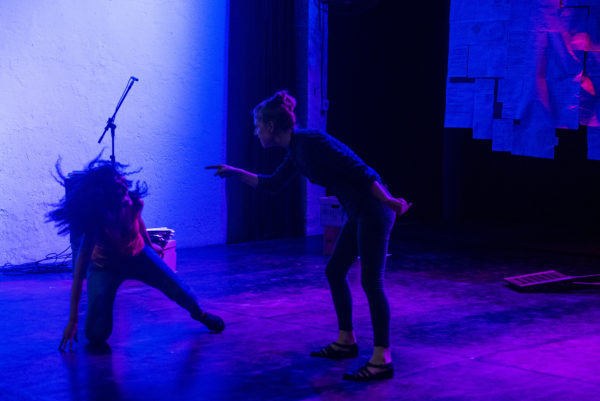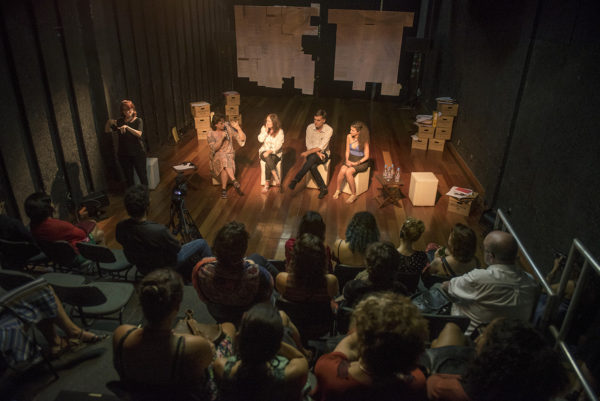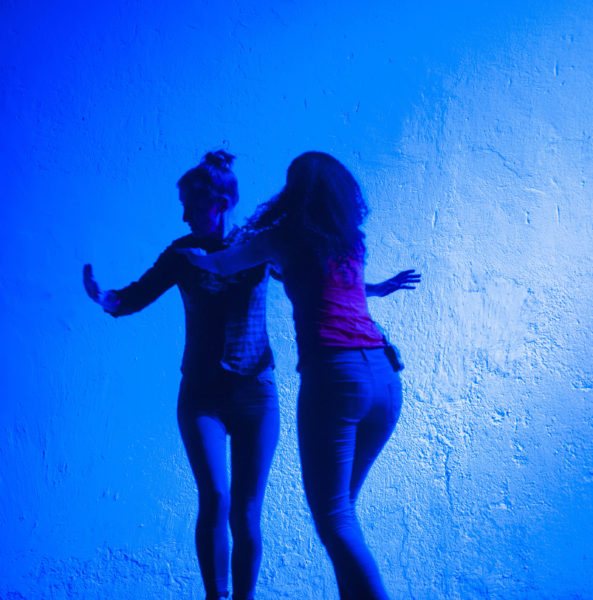Communicating the experiences of Violence Against Women and Girls (VAWG) among Brazilian migrants in London: reflecting on the role of the performing arts
In this piece, Cathy McIlwaine outlines some of the key findings from her project, Healthy, Secure and Gender Just Cities: Transnational Perspectives on Violence against Women and Girls (VAWG) in Rio de Janeiro and London. For more information on the project, please visit this website: https://transnationalperspectivesonvawg.wordpress.com. More information on Efêmera can also be found here: https://www.efemeraplay.com. All photos, of the play Efemera, are by Luciana Whitaker Aitkins.

We are living through times when women are increasingly coming forward with disclosures of their experiences of multiple forms of gender-based violence (GBV). Finally and belatedly, women’s voices are being heard as they report their often previously invisibilised and/or discredited experiences of GBV. While these disclosures might be new in the mainstream news, it is certainly not new to those working closely with women survivors of GBV in the UK and beyond. Indeed, UN Women (2013) and others have long identified that 1 in 3 women globally have experienced VAWG at some point in their lives, with incidence usually higher in cities (McIlwaine, 2013). Yet we know much less about the nature of VAWG among migrant women and those from Black and Minority Ethnic (BME) backgrounds beyond the fact that they have many more problems in reporting and being believed in their experiences of GBV. This lack of knowledge led to an ESRC-funded research project on exploring the nature of Violence Against Women and Girls (VAWG) among Brazilian migrants in London and Rio de Janeiro from a transnational perspective.
Following over ten years of collaboration with the Latin American Women’s Right Service (LAWRS) on the nature and growth of the Latin American community in London – which now comprises approximately 145,000 people in London and a quarter of a million in the UK as a whole, among which Brazilians are the largest nationality group (McIlwaine and Bunge, 2016) – a series of conversations led to the research project on VAWG among Brazilians. However, parallel conversations with Eliana Silva, who ran Redes da Maré in Rio de Janeiro in Brazil, made me realise that it is impossible to really understand the nature of VAWG as experienced by migrants without taking the situation back home into account. Thus the transnational project came into being through crucial collaboration with Paul Heritage, Professor of English and Drama at Queen Mary University of London, and the Peoples’ Palace Projects, who had been working closely with Eliana and who got a team from the Federal University of Rio de Janeiro led by Miriam Krenzinger on board.
On one hand, we wanted to understand much more about the experiences of VAWG among the Brazilian diaspora in London and in a favela called Complexo da Maré in Rio de Janeiro. And on the other, we really wanted to make the issue more visible to the general public and to policy-makers.
Focusing here on the Brazilian diaspora in London, and addressing the need to understand more about VAWG, we conducted survey, interview and focus group research with over 200 Brazilian women in London as well as 12 service providers. Among a huge range of issues that emerged, we found that four in every five Brazilian women surveyed had experienced GBV in their lifetime (82%), that nearly half (48%) of all Brazilian women had experienced some form of GBV in the UK, and that emotional/psychological violence was the commonest type of violence experienced in London (48%), followed by physical violence (38%), with 14% experiencing sexual violence. In addition, two-thirds of VAWG was perpetrated by men known to women, and most was perpetrated in the public sphere (78%), especially in the workplace. VAWG and international migration were interrelated in complex and transnational ways: 52% of women who suffered GBV in Brazil also experienced it again in London. 56% of women never reported an episode of violence in London, mainly because they thought nothing would be done about it, lack of information, shame and fear of deportation due to insecure immigration status
We are already in the process of publishing a series of reports that outline the core findings from the research in a format that we believe is accessible, as well as writing academic articles and a research monograph. While this broadly reflects traditional social science approaches to research dissemination, we also wanted to communicate through artistic practices. This is where the collaboration with the CASA Latin American Theatre Festival came in. We wanted to find a way to highlight Brazilian women’s experiences of VAWG in ways that departed from the written word. Actress and playwright Gäel le Cornec, who is part of CASA, took on the commission and created a verbatim play called Efêmera inspired by the interviews with the Brazilian women interviewed. Gäel is herself Brazilian and deeply committed to addressing gender inequalities and reducing VAWG.

This commitment comes across in Efêmera, which tells the story of a British documentary filmmaker, Jo, played by Rosie MacPherson, who interviews a Brazilian woman in London who has experienced GBV. The tale focuses on the life of Ana, who is initially reluctant to tell her story as it emerges that she has irregular immigration status. Yet as her story unfolds, she opens up about her experiences of incestuous childhood sexual abuse and extreme physical, sexual and emotional abuse at the hands of her ex-husband. Ana is afraid to speak of this at first because of her undocumented status and fears that she will not be heard or be wrongly accused by the judicial system, not least because she does not speak much English. It also transpires that Jo too has experienced GBV.
The play has so far been performed three times in London at the Southwark Playhouse as part of the CASA Festival in October 2017, including a panel discussion following the sell-out final performance. Although Efêmera focuses on the case of London, we also wanted to share it in Rio de Janeiro as part of a process of transnational learning and awareness-raising. We therefore took the play and performed it in Rio in the favela of Mare, where the Brazilian research has been conducted, at the Casa de Bellas Artes and at a feminist theatre festival at the Sede das Cias, again followed by post-show Q and As, both in November 2017.
While we are still garnering reactions to the play, what is clear is that it has been provocative, bringing an often taboo subject into the public domain and communicating the realities of VAWG in a visceral way that a research report cannot. While some commentators at the various post-show events suggested that the interview process was not ‘true to life’, that it came across as too coercive, others praised it for putting the interview process on the stage – something which is rarely done. Some commented that the voices of the women interviewed for the research were muted vis-à-vis those of Gäel and Rosie, others commended the efforts to ensure that experiences of VAWG are not confined to Brazilians, but also include British women. Not surprisingly then, the play has triggered different reactions from different members of the audience depending on their own positionalities and worldviews.

Through these varying responses, the performance has visibilized the issue of VAWG and the specificities of dealing with it as a migrant, as well as the more universal dimensions of women’s suffering, survival and agency. Interestingly, one unforeseen reaction to the performance was disclosure of experiences of GBV among women in the audience to Gäel as the main protagonist. After every performance, women came forward to speak with Gäel about their experiences of VAWG because they identified in some way with her/Ana. It is important that while direct disclosure was not necessarily anticipated, we did provide information in the London performances on sources of help for those affected by VAWG that were distributed with the programme. We soon realised that there was a responsibility inherent in the performance work as well as a desire to raise awareness.
There are clear advantages in being able to communicate research subjects’ stories in a visceral manner on stage, yet also disadvantages in the potential distortion of portraying the interview process or the realities of women’s experiences of VAWG that are often justifiably sacrificed for artistic effect in order to heighten the message. As we work on the final reports that outline the main social science findings from the research, we are continuing to reflect on the role of performance in communicating in ways that the written word cannot. What remains a constant however, is that levels of VAWG are alarmingly high, in London and beyond, and that women everywhere deserve their voices to be heard and for opportunities for safe reporting and follow-up assistance to be provided.
References
McIlwaine, C. (2013) Urbanisation and gender-based violence: exploring the paradoxes in the Global South, Environment and Urbanization, 25: 65-79.
McIlwaine, C. and Bunge, D. (2016) Towards Visibility: the Latin American Community in London, London: Trust for London: https://www.kcl.ac.uk/sspp/departments/geography/people/academic/mcilwaine/reports/Towards-Visibility-full-report.pdf; accessed 12/2/18
UN Women (2013) Ending Violence Against Women and Girls Programming Essentials, UN Women: http://www.endvawnow.org/uploads/modules/pdf/1372349234.pdf; accessed 29/10/2017.